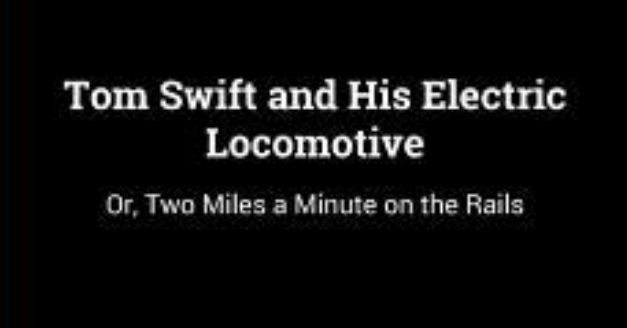CHAPTER XXIII — Tom Swift and His Electric Locomotive
byCHAPTER XXIII – Tom Swift and His Electric Locomotive begins with tension already rising, as Hercules 0001 strikes a bumper post at the end of a timber siding. The impact jars the massive locomotive, bending the front-end pilot and causing a moment of panic. Mr. Wakefield Damon, shaken but unharmed, quickly assesses the situation. Although the damage is visible, the locomotive remains operational. But the real danger hasn’t yet arrived. Moments later, a group of men led by Montagne Lewis appears, their intent hostile and their presence uninvited. Lewis, a broad-chested man with a dyed mustache and a habit of barking orders, demands to see Tom Swift. Mr. Damon, though outnumbered, remains composed and makes no mention of Tom or Ned’s whereabouts.
Instead of retreating further, Mr. Damon moves into the cab of the electric engine, locking the door and bracing himself against whatever might come next. His defiance surprises the gang. They pound on the cab’s door, hurling threats and warnings, but Mr. Damon refuses to give in. He arms himself with an ammonia pistol—a small but effective device invented by Tom Swift for self-defense. When Lewis attempts to force his way in, Mr. Damon pulls the trigger. A sharp burst of ammonia sprays directly into the ringleader’s eyes, sending him stumbling backward in pain. The gang hesitates, momentarily disoriented by their leader’s cries. Though he’s not known for violence, Mr. Damon’s act of resistance halts the attack. However, the threat hasn’t passed. Lewis regroups and begins to plot another move.
As the conflict simmers, the sharp sound of a train whistle slices through the air. A freight train, loaded with empty cars and building speed, is fast approaching. Lewis, wiping his eyes and gritting his teeth, realizes an opportunity. With the switch still set to direct the train toward the siding, he grins with malicious intent. Rather than continue their assault, the gang steps back, choosing not to warn the oncoming train. Their logic is cruel but calculated—if the freight train slams into Hercules 0001, it will destroy what they could not. Mr. Damon, inside the cab, hears the whistle as well. He peers through the window and sees the distant headlight growing larger by the second. The open switch, unrepaired since the accident, now represents disaster.
Desperation takes over as Mr. Damon searches for a way to stop the oncoming train or divert it. But communication is impossible. Tom’s telephone system, still under installation, remains inactive between this siding and the Cliff City yardmaster’s office. The line is incomplete—just a few critical connections short of being functional. The timing couldn’t be worse. What was supposed to be a system of instant communication now leaves them isolated in a moment of dire need. The yardmaster remains unaware of the broken switch. The freight train speeds toward them with no orders to stop or reroute. Mr. Damon’s hands grip the edge of the window frame. His thoughts race. There’s no time to escape. The locomotive could be destroyed.
The chapter’s final moments capture the helpless anticipation of a collision that seems inevitable. Mr. Damon shouts out into the darkness, hoping someone—anyone—might hear. The gang stands nearby, watching silently. Their sabotage doesn’t require further effort; the train will do the rest. Amid the rising noise of metal and speed, the future of Hercules 0001 hangs in the balance. And while Tom and Ned are still unaware of the unfolding danger, the consequences of communication failure and unchecked malice now converge on the isolated siding.
This chapter explores more than mechanical vulnerability; it illustrates how innovation can be undermined not only by enemies but also by timing and incomplete systems. Mr. Damon, often seen as eccentric, proves himself courageous under pressure. His defense of Tom’s invention, using intellect rather than force, shows that resolve and ingenuity remain critical even when odds seem stacked. Meanwhile, Lewis’s character grows more sinister. His willingness to let a train crash to destroy a rival exposes a man ruled by ego and fear of progress. As the chapter closes, the suspense tightens. Will anyone intervene in time? Or will Tom’s breakthrough be reduced to wreckage before it has a chance to succeed? The answers lie just beyond the approaching headlight.

